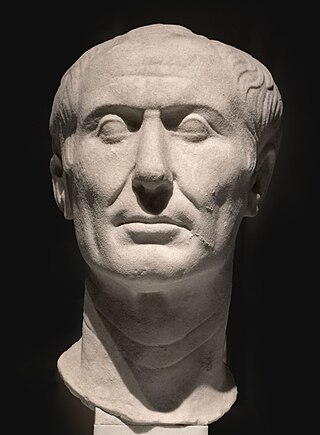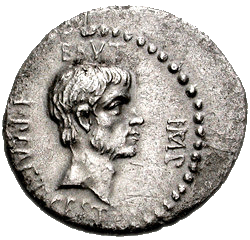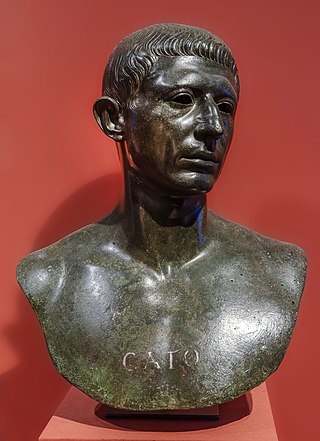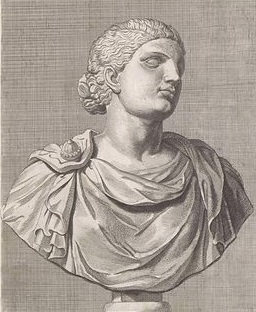
Gaius Julius Caesar was a Roman general and statesman. A member of the First Triumvirate, Caesar led the Roman armies in the Gallic Wars before defeating his political rival Pompey in a civil war, and subsequently became dictator from 49 BC until his assassination in 44 BC. He played a critical role in the events that led to the demise of the Roman Republic and the rise of the Roman Empire.

Marcus Antonius, commonly known in English as Mark Antony, was a Roman politician and general who played a critical role in the transformation of the Roman Republic from a constitutional republic into the autocratic Roman Empire.

Gnaeus Pompeius Magnus, known in English as Pompey or Pompey the Great, was a general and statesman of the Roman Republic. He played a significant role in the transformation of Rome from republic to empire. Early in his career, he was a partisan and protégé of the Roman general and dictator Sulla; later, he became the political ally, and finally the enemy, of Julius Caesar.

This article concerns the period 49 BC – 40 BC.
80s BC is the time period from 89 BC – 80 BC.

Marcus Junius Brutus was a Roman politician, orator, and the most famous of the assassins of Julius Caesar. After being adopted by a relative, he used the name Quintus Servilius Caepio Brutus, which was retained as his legal name. He is often referred to simply as Brutus.
Servilia was a Roman matron from a distinguished family, the Servilii Caepiones. She was the daughter of Quintus Servilius Caepio and Livia, thus the maternal half-sister of Cato the Younger. She married Marcus Junius Brutus, with whom she had a son, the Brutus who, along with others in the Senate, assassinated Julius Caesar. After her first husband's death in 77, she married Decimus Junius Silanus, and with him had a son and three daughters.

Marcus Porcius CatoUticensis, also known as Cato the Younger, was an influential conservative Roman senator during the late Republic. His conservative principles were focused on the preservation of what he saw as old Roman values in decline. A noted orator and a follower of Stoicism, his scrupulous honesty and professed respect for tradition gave him a powerful political following which he mobilised against powerful generals of his day, including Julius Caesar and Pompey.

Sextus Pompeius Magnus Pius, also known in English as Sextus Pompey, was a Roman military leader who, throughout his life, upheld the cause of his father, Pompey the Great, against Julius Caesar and his supporters during the last civil wars of the Roman Republic.
Decimus Junius Brutus Albinus was a Roman general and politician of the late republican period and one of the leading instigators of Julius Caesar's assassination. He had previously been an important supporter of Caesar in the Gallic Wars and in the civil war against Pompey. Decimus Brutus is often confused with his distant cousin and fellow conspirator, Marcus Junius Brutus.

Porcia, occasionally spelled Portia, especially in 18th-century English literature, was a Roman woman who lived in the 1st century BC. She was the daughter of Marcus Porcius Cato Uticensis and his first wife Atilia. She is best known for being the second wife of Marcus Junius Brutus, the most famous of Julius Caesar's assassins, and appears primarily in the letters of Cicero.
Marcus Calpurnius Bibulus was a politician of the Roman Republic. He was a conservative and upholder of the established social order who served in several magisterial positions alongside Julius Caesar and conceived a lifelong enmity towards him. In 59 BC, he was consul alongside Julius Caesar. Their partnership was contentious to the extent that Caesar's supporters assaulted Bibulus in Rome's main forum on the eve of an important vote. Bibulus withdrew from public politics for the rest of his term.

Calpurnia was either the third or fourth wife of Julius Caesar, and the one to whom he was married at the time of his assassination. According to contemporary sources, she was a good and faithful wife, in spite of her husband's infidelity; and, forewarned of the attempt on his life, she endeavored in vain to prevent his murder.

Julia was the daughter of Roman dictator Julius Caesar and his first or second wife Cornelia, and his only child from his marriages. Julia became the fourth wife of Pompey the Great and was renowned for her beauty and virtue.
Marcus Junius Brutus was a plebeian tribune of the Roman Republic in 83 BC and the founder of the colony in Capua. He was an associate of Marcus Aemilius Lepidus, who led a revolt against the senate after the death of Sulla. He was captured by Pompey and treacherously executed. He was the father of a homonymous son, who assassinated Julius Caesar in 44.

Julius Caesar was assassinated by a group of senators on the Ides of March of 44 BC during a meeting of the Senate at the Curia of Pompey of the Theatre of Pompey in Rome where the senators stabbed Caesar 23 times. They claimed to be acting over fears that Caesar's unprecedented concentration of power during his dictatorship was undermining the Roman Republic. At least 60 to 70 senators were party to the conspiracy, led by Marcus Junius Brutus, Gaius Cassius Longinus, and Decimus Junius Brutus Albinus. Despite the death of Caesar, the conspirators were unable to restore the institutions of the Republic. The ramifications of the assassination led to his martyrdom, the Liberators' civil war and ultimately to the Principate period of the Roman Empire.
Marcus Favonius was a Roman politician during the period of the fall of the Roman Republic. He is noted for his imitation of Cato the Younger, his espousal of the Cynic philosophy, and for his appearance as the Poet in William Shakespeare's play Julius Caesar.
The career of Julius Caesar before his consulship in 59 BC was characterized by military adventurism and political persecution. Julius Caesar was born on 12 July 100 BC into a patrician family, the gens Julia, which claimed descent from Iulus, son of the legendary Trojan prince Aeneas, supposedly the son of the goddess Venus. His father died when he was just 16, leaving Caesar as the head of the household. His family status put him at odds with the Dictator Lucius Cornelius Sulla, who almost had him executed.

The military campaigns of Julius Caesar were a series of wars that reshaped the political landscape of the Roman Republic, expanded its territories, and ultimately paved the way for the transition from republic to empire. The wars constituted both the Gallic Wars and Caesar's civil war.

The first-century-BCE Roman statesman and commander Pompey the Great was married five times. These marriages were not only romantic matches, but political arrangements, often dictated by Pompey's political career and need to form alliances with other powerful Roman men.












